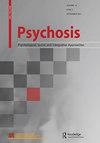一份包含15个项目的成人心理健康住院康复过程问卷英文版的混合方法验证
IF 1
4区 医学
Q4 PSYCHIATRY
Psychosis-Psychological Social and Integrative Approaches
Pub Date : 2023-11-07
DOI:10.1080/17522439.2023.2271051
引用次数: 0
摘要
摘要背景恢复是医疗保健服务中的一个关键成果,可以使用关于恢复过程的问卷(QPR)进行评估。研究表明在社区样本中有良好的心理测量特性,但没有研究将其扩展到住院患者环境中。质素保证程序检讨的表面效度尚未评估。本研究旨在探讨成人心理健康住院康复患者QPR的心理测量特性。方法对150例住院患者进行QPR问卷调查。10例住院患者参加了半结构化访谈,以评估面部和并发效度。结果单因素解决是合适的,解释了51.4%的方差。内部一致性极好(α = 0.94)。没有观察到下限或上限效应。访谈显示良好的面孔效度和内容效度。总体而言,本研究支持在住院康复环境中使用15项QPR,因为所有评估的心理测量特性都是足够的。一些与会者提出了质量审查程序未涵盖的其他康复方面,支持将质量审查程序与其他针对症状的措施结合使用。披露声明作者未报告潜在的利益冲突。本文章由计算机程序翻译,如有差异,请以英文原文为准。
A mixed-methods validation of the 15-item English version of the Questionnaire about the Process of Recovery (QPR) in an adult mental health inpatient rehabilitation setting
ABSTRACTBackground Recovery is a key outcome within healthcare services and can be assessed using the Questionnaire about the Process of Recovery (QPR). Research indicates good psychometric properties in community samples, but no research has extended this to inpatient settings. The face validity of the QPR has not been assessed. This research aimed to explore the psychometric properties of the QPR in an adult mental health inpatient rehabilitation setting.Method 150 inpatients completed the QPR questionnaire. 10 inpatients participated in a semi-structured interview to assess face and concurrent validity.Results The results indicated a single factor solution was appropriate, explaining 51.4% of the variance. Internal consistency was excellent (α = 0.94). No floor or ceiling effects were observed. Interviews indicated good face and content validity.Discussion Overall, this research supports the use of the 15-item QPR in inpatient rehabilitation settings as all assessed psychometric properties were adequate. Some participants suggested additional aspects of their recovery that the QPR did not cover, supporting the use of the QPR alongside other symptom-specific measures.KEYWORDS: QPRrecoveryrehabilitationvalidation Disclosure statementNo potential conflict of interest was reported by the author(s).
求助全文
通过发布文献求助,成功后即可免费获取论文全文。
去求助
来源期刊
CiteScore
2.20
自引率
8.30%
发文量
36

 求助内容:
求助内容: 应助结果提醒方式:
应助结果提醒方式:


